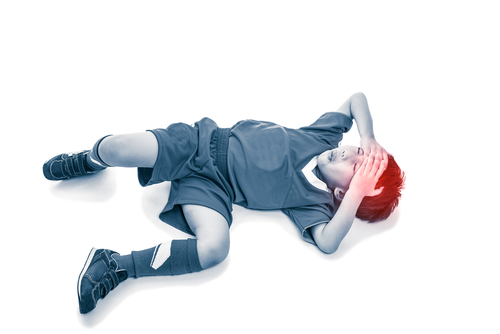Many youth and high school athletes are unaware they have experienced a concussion. Even worse, many athletes hide their concussion symptoms from their parents and coaches. Research suggests 69% of athletes with a possible concussion played with concussion symptoms. This could negatively impact a young athlete’s life forever. As a parent, you are responsible for the safety and well-being of your child. Understanding the seriousness of concussion, and how to recognize it is essential to your child’s safety.
What is a Concussion?
A concussion is a type of brain injury caused by a blow or jolt to the head. Also, they can occur from a hit to the body that causes the head to move rapidly back and forth. This causes the brain to bounce around a bit in the head. Chemical changes or even stretching in the head can damage brain cells.
These chemical changes make the brain more sensitive to further injury until it fully recovers. A repeat concussion during recovery increases the chances of long-term problems. Although rare, repeat concussions before recovery can result in permanent brain damage or even death.
Signs and Symptoms of Concussion
Most concussions that occur during sports happen from colliding with another player. And most occur without loss of consciousness. Children who show or report 1 or more of the signs and symptoms listed below may have a concussion. If your child shows any of these signs or symptoms, they should be immediately removed from play. No exceptions!

Signs Observed by Parents or Coaches
- Appears dazed or stunned
- Forgets an instruction, is confused about a position, or is unsure of the game, score, or opponent
- Moves clumsily
- Answers questions slowly
- Loses consciousness (even briefly)
- Shows mood, behavior, or personality changes
- Can’t recall events prior to or after a hit or fall
Symptoms Reported by Children
- Headache or “pressure” in the head
- Nausea or vomiting
- Balance problems or dizziness, or double or blurry vision
- Bothered by light or noise
- Feeling sluggish, hazy, foggy, or groggy
- Confusion, concentration, or memory problems
- Just not “feeling right,” or “feeling down”
Do not try to judge the severity of the injury yourself. Only a healthcare provider should assess a child for a possible concussion. Concussion signs and symptoms often show up soon after the injury. But you may not know how serious the concussion is at first, and some symptoms may not show up for hours or days.
When in Doubt Keep Them Out and See a Doctor
As a parent, if you think your child may have a concussion, you should remove your child from play. Keep him or her out of play the day of the injury. Don’t let your child or a coach talk you into allowing him or her to return to play.
Schedule an appointment with your child’s healthcare provider. In the absence of any serious complications (see below), they should be evaluated within 24 to 48 hours. Any athlete with a possible concussion should only return to play with permission from a healthcare provider who is experienced in evaluating for concussions.

Unlike a broken bone, you cannot see a concussion on an x-ray. Concussions are disruptions in how the brain works. They are not “bruises” to the brain. CT Scans and MRIs are normal with most concussions. So don’t demand these tests right away. Expensive testing is only warranted when certain danger signs are present.
What Are Some More Serious Danger Signs to Look Out For?
In rare cases, a dangerous collection of blood may form on the brain after head trauma. Call 9-1-1 or take your child to the emergency department right away if, after a blow or jolt to the head or body, they have one or more of these danger signs:
- One pupil is larger than the other
- Drowsiness or inability to wake up
- A headache that gets worse and does not go away
- Slurred speech, weakness, numbness, or decreased coordination
- Repeated vomiting or nausea, convulsions or seizures (shaking or twitching)
- Unusual behavior, increased confusion, restlessness, or agitation
- Loss of consciousness (passed out/knocked out). Even a brief loss of consciousness should be taken seriously.
Returning to School and Sports After Concussion
The brain needs time to heal after a concussion. Therefore, your child’s return to school and sports should be a gradual process that is carefully managed and monitored by a team of healthcare providers. This team usually includes a pediatrician, neurologist, physical therapist, and/or athletic trainer.
A day or two of rest after a concussion helps the brain recover. Extended periods of rest will delay recovery. It is important to first reintegrate your child back into school. This is the first step in your child’s rehabilitation. Sometimes returning to school requires modifications for a few days or possibly a few weeks.
After returning to school, your child should begin a 5-step return to play rehabilitation program. A physical therapist or athletic trainer experienced in managing athletes with concussions should direct this program. Only after passing through each stage can an injured athlete be cleared to return to play.

See Your Physical Therapist to Begin the Return to Play Program
Most children with a concussion will recover within a couple of weeks. However, some will have symptoms for months or longer. Working closely with a physical therapist will facilitate a safe return to play for your child.
The doctors of physical therapy at BSR have been helping injured athletes return to sports since 2007. If your child has had a concussion, call our office and schedule an appointment for an initial evaluation. In most cases, the sooner rehab begins, the better the long-term outcome will be.

